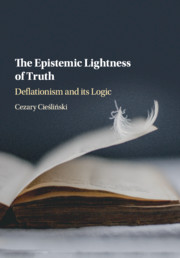Book contents
13 - Deflationism and Truth-Theoretical Strength
from Part III - Reflection Principles
Published online by Cambridge University Press: 30 November 2017
Summary
In Chapter 5, I discussed the generalisation problem as the basic difficulty facing disquotational truth theories. It is worth stressing that criticisms based on the conservativeness argument go in a somewhat similar direction. After all, the argument in question points to the deductive weaknesses of truth theories (not necessarily disquotational ones) and to their unsuitability for proving certain truth-theoretic generalisations. I have already presented – and deemed inadequate – some solutions proposed in the literature (cf. Chapter 5 and Section 11.2.1 of Chapter 11.2). The main objective here will be a presentation and a defence of a strategy employing reflection principles, which will permit me to present a uniform answer to the critics of deflationism.
Both the generalisation problem and the conservativeness argument will be treated here as variants of one and the same broader question, which takes the following form:
(Q) Given that we accept a theory K, why should we accept various additional statements, which are unprovable in K?
This perspective could be adopted by the critic whose starting point is the observation that K is a theory of truth accepted by the deflationist. If K is disquotational, the critic can argue that the acceptance of T-biconditionals commits the deflationist to the acceptance of compositional principles not derivable in K. Thus, with this option the generalisation problem is introduced as the challenge of explaining such commitments. If K is conservative (not necessarily disquotational), then the critic proceeds in exactly the same manner, indicating that the various statements unprovable in K (Godel sentences, consistency statements, reflection principles) should be accepted once we accept K. Thus, the conservativeness argument appears on the scene.
Of course the critic might choose a different presentation of his reasoning, one which does not require accepting K as a premise. Even so, the deflationist is fully entitled to employ the acceptance of K as a key premise in his own defence against the challenge. Answering (Q) permits him to do just that. If he is able to show that the acceptance of, say, compositional principles becomes fully rational once K is accepted, then the critic's challenge is met. Indeed, this is exactly the strategy which will be pursued here.
- Type
- Chapter
- Information
- The Epistemic Lightness of TruthDeflationism and its Logic, pp. 232 - 278Publisher: Cambridge University PressPrint publication year: 2017



